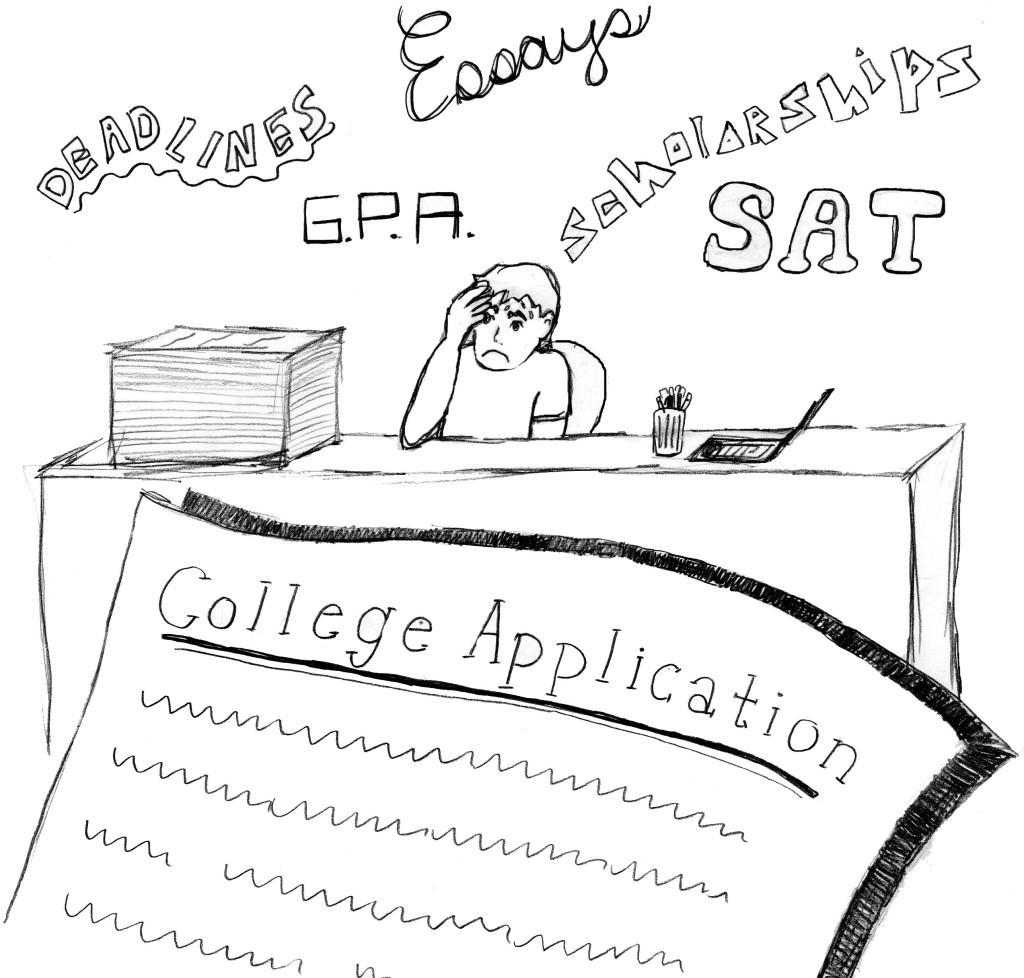During what is made out to be the hardest year of their academic lives, juniors are inundated by AP classes, standardized tests, extracurricular activities, and college counseling, not to mention the stress involved in trying to live up to their parents’ expectations and the pressure of being accepted into a good college. How do they maintain their sanity? Juniors are only at the beginning of what will be one of the longest roller coaster rides of their lives: the college admissions process.
“What’s stressing me out the most right now about the college admissions process is keeping my grades up because my classes are very difficult,” said junior Kevin Hayne. “Also, finding time to study for all my SATs, SAT subject tests, and the ACT and managing my extracurricular activities are quite challenging.”
Juniors take an average of two to three AP classes, with some taking four, five, or even six. AP classes are designed to challenge students more than honors classes and to prepare students for AP exams, which cover entire AP courses. Most juniors also take the SAT for the first time in the spring. Taking the SAT can become stressful for juniors, especially for those who are unable to attain the score they desire, even after taking it multiple times. Fortunately though, the SAT is not the only thing colleges look at.
“In my opinion, it’s not horrible if you receive a bad SAT score because colleges are not just going to look at your SAT score; they’re also going to look at your grades from the past year because maybe you’re just a bad test taker,” said junior Drew Ferguson.
Compared to seniors, juniors have it easy. On top of AP classes, standardized tests, and extracurricular activities, seniors have to write college application essays, update their resumes periodically, and meet deadlines. The stress during this part of the process can be overwhelming, especially for those who apply to many schools.
“I applied to a lot of schools–I think my list originally had 20 colleges, but I narrowed it down to eight or nine-so trying to make the deadlines was the most stressful part,” said senior Kelly Fahey.
Waiting to hear back from the college of your choice is also stressful. hether it’s the suspense of seeing if the envelopes are thick (accepted) or thin (rejected or maybe wait-listed), or hovering around the computer with the cursor pointed over the “decision” button on colleges’ websites, students think that if they don’t get into their first choice college, their life is over.
“You really have to keep an open mind and you can’t become fixated on getting into one school,” said Fahey. “You’d be devastated if your entire life was geared on getting into one school.”
Each junior is assigned a college counselor in the first semester of junior year. College counselors assist juniors and seniors in searching for colleges that they [juniors and seniors] think would fit them best and help them meet not only the college’s deadlines, but the earlier deadlines that the counselors set for them.
“It is important to set our own deadlines for college applications because we don’t want seniors to be working at the last minute,” said Co-Director of College Counseling Mary Donohue. “It saves them unnecessary stress if they meet our deadline and then have a bunch of time to check it [their application] over.”
“If students wait until the last minute, colleges are dealing with an incredible influx of information and documents and when you’ve got that incredible flow, snafus and trip-ups can happen,” said College Counselor Stephanie Dryden. “But if you’ve applied early, then everything will be okay.”
The somewhat arbitrary selection process of colleges also contributes to the stress of students. Most colleges tend to favor a variety of people, not necessarily the smartest. For example, a well-rounded, all-star student is not necessarily guaranteed admission into Stanford, and an average student is not necessarily not guaranteed admission either. “It is important to celebrate every acceptance and to keep all news in perspective,” said Donohue. “Decisions are a reflection of the process, not who you are personally and… you don’t have any control over the other applicants and what the priorities were for that admissions office.”
“You don’t know if they’re looking to get more kids from the pacific northwest or from the southeast or if they want a greater percentage of minorities at their school,” said Co-Director of College Counseling Lester Johnson. “You have no way of knowing.”
During and after the stressful process, it is important for students to channel their positive energy. In other words, after students find out the good news of being accepted into a college, they should maintain their relationships with their teachers, college counselor, and other faculty.
“Students should remain engaged in their relationships with folks as they’re getting decisions and to still think about their nest here at home, Trinity,” said Johnson. “Go and touch base with these your teachers because they’re as curious to know about your decisions and to celebrate. We do the high five here out in the hallway and we enjoy that; it’s the sweet spot of the job for us. But as spring approaches, relations get a little sparse in the spring because seniors are moving on. That’s why we encourage them to continue to maintain their relationships with us and to come visit us when they’re in college.”















